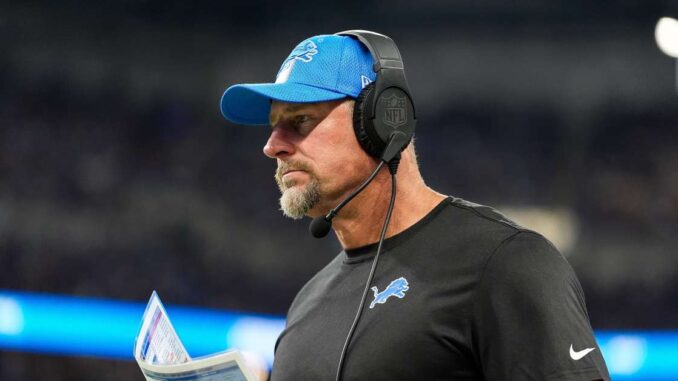
In the wake of the Detroit Lions’ disappointing loss to the Tampa Bay Buccaneers, head coach Dan Campbell took full responsibility for the defeat, marking a moment of profound reflection and accountability for the Lions’ leadership. Campbell’s decision to shoulder the blame is a testament to his character and commitment to the team, yet it also opens up a broader discussion about the dynamics of leadership and coaching in the NFL.
The Lions’ loss to the Buccaneers was a significant setback, particularly given the high expectations surrounding Detroit this season. The game, which saw the Buccaneers edge out the Lions in a closely contested battle, was marked by several pivotal moments where the outcome could have swung in either direction. For Campbell, the post-game analysis revealed critical areas where his decisions and strategies fell short, leading him to openly admit his role in the defeat.
Campbell’s admission of fault reflects his leadership style, which is characterized by a high level of transparency and accountability. In the press conference following the game, Campbell addressed the media with a candid demeanor, acknowledging that he could have made better decisions throughout the match. His remarks included an acknowledgment of missed opportunities, strategic errors, and the impact of those missteps on the team’s performance.
One of the key areas Campbell highlighted was his game management. In the heat of competition, decisions regarding play-calling, clock management, and personnel changes can significantly influence the outcome of a game. Campbell expressed regret over certain calls that, in hindsight, may have contributed to the loss. This level of introspection is a critical aspect of effective coaching, as it involves assessing not only the execution on the field but also the strategic choices made from the sidelines.
Campbell’s approach to handling the loss underscores the importance of leadership in sports. By publicly taking responsibility, he not only demonstrates accountability but also sets a tone of unity and collective effort. In professional sports, especially in high-pressure environments like the NFL, the way a leader handles defeat can have a profound impact on team morale and dynamics. Campbell’s willingness to own the outcome serves as a powerful example of how leaders can foster resilience and maintain focus on improvement.
Furthermore, Campbell’s comments prompted a broader discussion about the factors contributing to the Lions’ loss. The game featured several key moments where the team’s performance faltered, including missed opportunities on offense, defensive lapses, and critical mistakes in execution. While Campbell took responsibility, it is also essential to examine how these issues were addressed throughout the week leading up to the game and the adjustments made during the match.
In analyzing the game, it became apparent that the Buccaneers exploited certain weaknesses in the Lions’ game plan. Tampa Bay’s offense capitalized on gaps in the Lions’ defensive schemes, while the Buccaneers’ defense managed to stifle Detroit’s offensive efforts at crucial moments. Campbell and his coaching staff will need to dissect these areas and implement corrective measures to address these vulnerabilities moving forward.
Campbell’s leadership is often defined by his ability to motivate and inspire his players, qualities that have been evident since he took over as head coach. However, the loss to the Buccaneers presents an opportunity for further growth and development. The ability to learn from setbacks and adapt strategies is a crucial component of success in the NFL. Campbell’s openness about the mistakes made provides a foundation for the Lions to regroup and refocus their efforts.
Looking ahead, the Lions will need to analyze the game thoroughly and make necessary adjustments. This includes reviewing game tape, assessing individual and team performance, and refining strategies to better prepare for future opponents. Campbell’s role in this process will be pivotal, as he works to implement changes that will enhance the team’s performance and address the issues highlighted in the loss to the Buccaneers.
Additionally, Campbell’s handling of the situation may influence how his team responds to adversity. Players often look to their coaches for guidance and reassurance during challenging times. Campbell’s willingness to take responsibility and address mistakes head-on can serve as a motivating factor for his team, encouraging them to approach their preparations and performances with a renewed sense of purpose and determination.
In the broader context of NFL coaching, Campbell’s approach to accountability is a reflection of the evolving nature of leadership in sports. The modern coach is not only a strategist and motivator but also a figure who embodies humility and introspection. Campbell’s willingness to take blame and work towards improvement is emblematic of the qualities that define effective coaching in today’s game.
In conclusion, Dan Campbell’s decision to take responsibility for the Detroit Lions’ loss to the Tampa Bay Buccaneers highlights his commitment to leadership and accountability. While the defeat was a setback, Campbell’s approach provides valuable lessons in handling adversity and fostering a culture of growth and resilience. As the Lions move forward, Campbell’s leadership will play a crucial role in guiding the team through challenges and positioning them for future success.
Leave a Reply